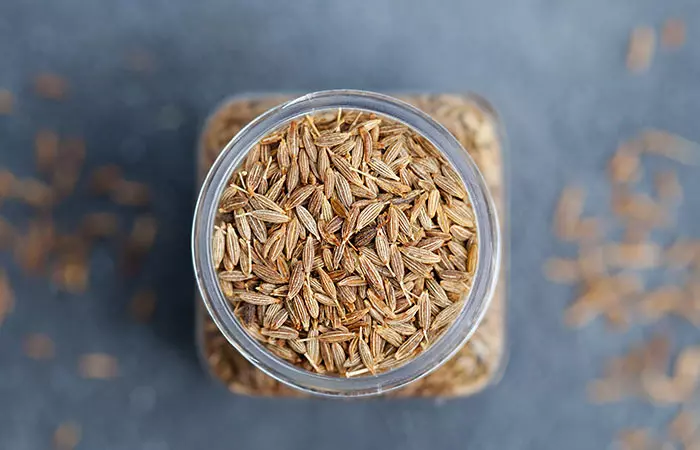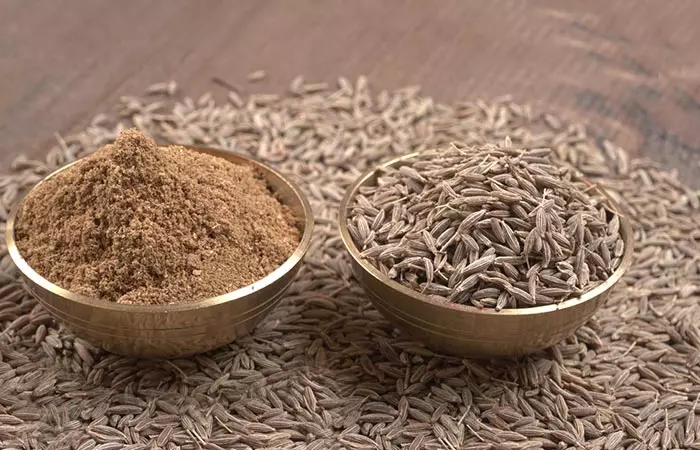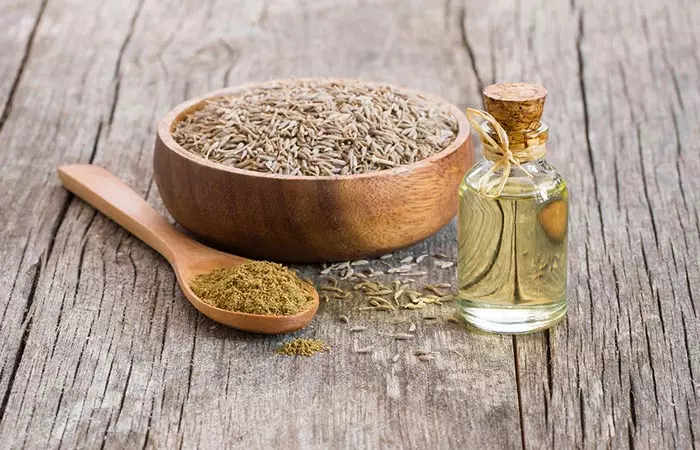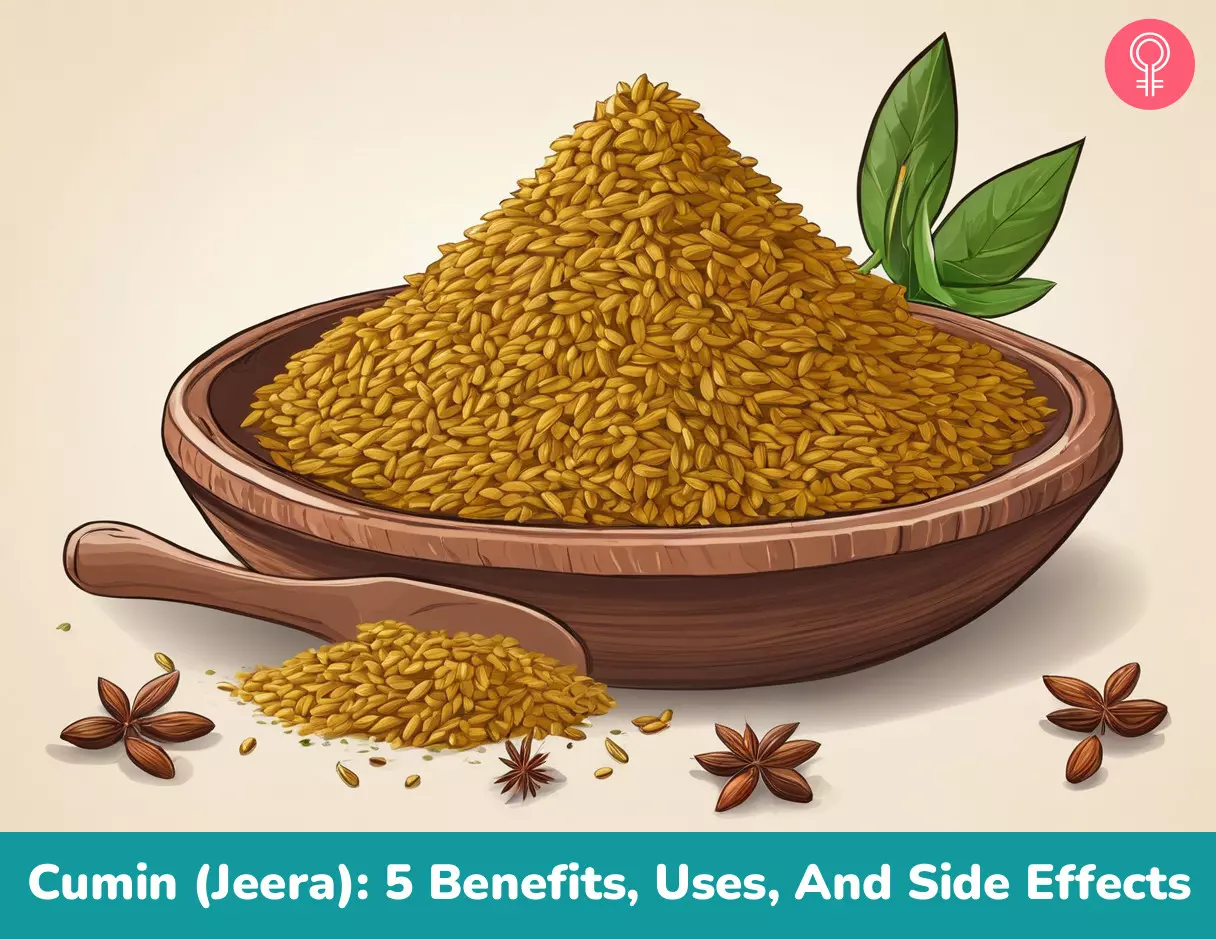Folk and traditional medicines bet big on cumin to improve digestion, boost the immune system, and prevent/treat inflammation (1). But what does science say? This article talks about everything you need to know about cumin, its nutritional facts, benefits, potential side effects, and the different ways to consume it. Swipe up
Cumin Seeds: In Detail
The cumin (Cuminum cyminum) plant belongs to the Apiaceae family. The seeds of this plant are a popular and distinctly fragrant culinary spice. Cumin is one of the earliest crops to be cultivated in Asia, Europe, and Africa (1). Who Can Use It? Safe for moderate consumption for everyone. How Often? Can be used in cooking every day in small amounts. Caution It can interfere with major classes of drugs, leading to mild to severe allergic reactions. The seeds of this plant have been used in traditional medicine for treating digestive, lung, and liver disorders. Cumin seeds are now integral in folk medicine across Northern Europe to the Mediterranean regions, Russia, Indonesia, Iran, and North America (1). Cumin seeds are potent carminative, stimulant, antiseptic, and anti-hypertensive agents. These seeds are rich in essential oils, oleoresins, tannins, sesquiterpenes, etc. (1), (2).
What Are The Benefits Of Cumin Seeds?
Cumin seeds or jeera benefits overall health if included in the diet. These seeds are an excellent digestive aid. They reduce bloating and gas. Drinking cumin water might help you lose body weight. These seeds can maintain blood cholesterol levels too.
1. Aid Digestion
Traditional medicine vouches for the carminative property of cumin seeds. It uses ginger, celery seed, thyme, anise, and fennel, along with cumin to relieve flatulence and bloating (3). These seeds can stimulate the liver to secrete bile rich in bile acids. Bile acids help in effective fat digestion and absorption. Due to the anti-inflammatory and analgesic (painkilling) effects, cumin seeds can control abdominal pain and spasms in patients with irritable bowel syndrome (IBS) (4), (5). Research shows that cumin can also prevent gastrointestinal complications after Cesarean section in pregnant women. It does so by decreasing the colicky pains, heartburn, and delayed gas passage (5).
2. Promote Weight Loss
Obesity is linked to cardiovascular diseases, diabetes, and osteoarthritisi A subtype of arthritis, a joint disease where the cushioning cartilage between the joints breaks down due to old age or excess use. . Exercise and suitable diet plans may accelerate the weight loss process. Supporting herbal medicine has shown positive results in this case. Cumin is a traditional remedy for weight loss (6). Consuming cumin and lime may reduce appetite and increase lipolysisi The process of lipid breakdown where lipid contents are broken down into fatty acids and glycerols. . A clinical study revealed that cumin-lime administration for 8 weeks reduced the BMI (body mass index) and total cholesterol levels in the subjects (6). Eating cumin powder (about 3 g/day) with yogurt post meals for 3 months reduced the waist circumference in obese women. It increased HDL levels and cut down the fat mass (7). Many people also drink jeera water for weight loss. Simli, a skincare and makeup blogger, opens up about her weight loss journey, crediting it to drinking cumin water. She reveals, “…I don’t get much time to workout, I drink an awesome drink everyday once in the morning and once in the evening to lose and control my body weight…. I am quite sure that all of you must have heard that cumin seed which [is] also known as Jeera helps to lose weight, my slim down weight loss drink’s main ingredient is cumin seeds (i).”
3. Possess Anti-Inflammatory Properties
Cumin seeds contain nearly 3-4% of the essential oil. Cumin essential oil is an anti-inflammatory, antioxidant, and anti-allergic agent. It has active phytochemicals that bring about these effects. Cumin seed oil inhibits the production of anti-inflammatory compounds, including interleukins (IL-1 and IL-6), tumor necrosis factor (TNF-α), and nitric oxide (NO). This oil also prevents the activation of immune system cells involved in inflammation (8). Hence, cumin is often added to the anti-inflammatory diet (AID) regimens. Along with spices like turmeric, ginger, rosemary, clove, etc., cumin seeds can relieve several inflammatory disorders (9).
4. Control Cholesterol Levels
The dried seeds of cumin have flavonoids with antioxidant capacity. They inhibit lipid peroxidation, which, in turn, causes a dip in oxidized low-density lipoprotein (ox-LDL) levels. The accumulation of ox-LDL is linked to atherosclerosisi A medical condition caused by a build-up of plaque in or on the artery walls, resulting in blockage of blood flow. and coronary heart diseasei A cardiovascular disease where the arteries are blocked. by plaque build-up, causing obstruction in the flow and circulation of blood. (10). Cumin contains cuminaldehyde and flavonoids that lower the levels of ox-LDL. The active components, along with manganese and zinc, activate your body’s antioxidant enzymes (10). These enzymes (like superoxide dismutase, catalase, etc.) scavenge free radicals that trigger lipid peroxidation. These effects extend to protect you from diabetes and cardiovascular diseases (10).
5. Help Manage Diabetes
Rat studies demonstrate the antidiabetic effect of cumin. The cumin flavonoids lower blood glucose levels, thanks to their antioxidant property. The free radical-scavenging effect was more pronounced in individuals with diabetes than the control rats (11). Administering cumin extracts to those with diabetes type II may decrease the fasting blood sugar and serum insulin levels. Researchers also report a drop in the levels of glycosylated hemoglobin, which is a pathological indicator for diabetes (12). According to a report released by the National Institute of Diabetes and Digestive and Kidney Diseases, an aggregate of 37.3 million (About 11.3%) people in the United States had diabetes in 2019. This includes 283,000 children and adolescents below or up to the age of 20. Due to the anti-inflammatory activity, cumin seeds or their extracts mitigate the complications of diabetes. Also, green cumin was found to have stronger antidiabetic properties than the black variant (11), (12).
Nutritional Profile Of Cumin Seeds
Cumin is also an excellent source of bioactive ingredients. It contains volatile oils (3-4%) and 45-50% of cuminaldehyde, which is its primary active principle (2). – Cumin oil has analgesic and anti-nociceptivei A medical process that helps control or reduce sensitivity to pain by blocking sensory neurons from detecting the pain. properties. It can relieve pain and spasms by acting on the central nervous system (CNS). – This oil can control blood clotting/platelet aggregation, and at the same time, boost hemoglobin levels (1). – Cumin seeds have potent antimicrobial activity. Cuminaldehyde inhibits the growth of several bacteria, fungi, and yeast species (1). Limonene, α- and β-pinene, 1,8-cineole, o- and p-cymene, α- and γ-terpinene, safranal and linalool are other phytochemicals identified in cumin. Extracts of cumin seeds contain various alkaloids, flavonoids, isoflavonoids, tannins, lignins, and phenolic compounds. Read on to find out how else you can use cumin.
What Are The Different Ways To Take Cumin?
You can also find ground cumin seed powder. This can be used in making curries, stews, condiments, and sauces. If you don’t like to add the seeds or the powder to your food, there is another good option. Cumin is available in the form of capsules. Cumin seed oil is another medically acclaimed alternative. You can try the one from black cumin (Nigella sativa).This essential oil is also sold as softgels. Traditional practitioners recommend cumin water as an effective remedy for acute disorders. This drink can help you lose weight, boost immunity, and clean your gut. Here’s how you make it.
How To Make Cumin Water/Jeera Water/Cumin Tea
You can make cumin water by boiling or soaking the seeds.
Method 1: Boiling
Method 2: Soaking
You can replace bottles of regular water with cumin water. Try adding cinnamon or lime juice to this drink to make it tastier. Despite all the efforts, if you still don’t like the taste of cumin, you can substitute it with caraway seeds. Ground coriander powder also works well in the place of cumin powder. You can also try curry powder or taco seasoning mix if you run out of cumin powder. Adding cumin to your dishes makes your meals healthier. But what happens when you have too much of it? Keep reading to learn more.
Does Cumin Have Any Side Effects Or Risks?
One of the most reported side effects of cumin seeds consumed in excess is drug interactions (1). Research suggests that cumin extract can interfere with the activity of anticoagulants (blood thinners), antibiotics, and hypoglycemic (anti-diabetic) drugs (13), (1). Active cumin compounds may interact with these drugs and cause hypoglycemia (sudden drop in blood sugar levels). They can also lead to longer bleeding time (13). However, there are hardly any reports on the toxicity of cumin. It is presumed that this herb is safe for human consumption, even at high doses. Cumin oil can cause mild to moderate irritation. Read the safety sheet carefully before using (14). Do not get confused with the studies on black cumin seeds. The green and black varieties might be metabolized differently. It is best to consult your healthcare provider or a nutritionist to understand how cumin works. Is fennel also called cumin? No, fennel and cumin are two different plants. Cumin seeds are brownish in color whereas fennel seeds are greenish. Cumin seeds tastes mildly spicy and pungent whereas fennel seeds taste sweet. Can I drink cumin water everyday? You can drink cumin water everyday in moderate quantities as overconsumption of cumin water may lead to side effects such as low blood pressure, heavy menstrual bleeding and heartburn. Can we add lemon in jeera water? Yes, you can add lemon in jeera water. Can I add honey in jeera water? Yes, you can add honey in jeera water for enhancing its taste and digestive properties. However, that may break your fast if you are intermittent fasting. Does jeera water cause heavy periods? As jeera can have anticoagulant effects on the body, it may also cause heavy menstrual bleeding if consumed in excess.
Illustration: Cumin (Jeera): 5 Benefits Uses And Side Effects
Discover the surprising benefits and uses of cumin seeds that you never knew about! Watch this video to learn how cumin seeds help in digestion and weight loss and promote skin health.












